
The Korean Martyrs were the victims of religious persecution against Catholics during the 19th century in Korea. Among them are 103 Saints and 124 Blesseds officially recognized by the Catholic Church.
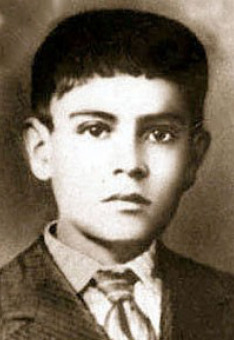
José Luis Sánchez del Río was a Mexican Cristero who was put to death by government officials because he refused to renounce his Catholic faith. His death was seen as a largely political venture on the part of government officials in their attempt to stamp out dissent and crush religious freedom in the area. He was dubbed "Joselito."

Fidelis of Sigmaringen, OFM Cap. was a German Capuchin friar who was involved in the Catholic Counter-Reformation. He was martyred by his opponents at Seewis im Prättigau, now part of Switzerland. Fidelis was canonized in 1746.

Genesius of Rome is a legendary Christian saint, once a comedian and actor who had performed in plays that mocked Christianity. According to legend, while performing in a play that made fun of baptism, he had an experience on stage that converted him. He proclaimed his new belief, and he steadfastly refused to renounce it, even when the emperor Diocletian ordered him to do so.

The Martyr Saints of China, or Augustine Zhao Rong and his Companions, are 120 saints of the Catholic Church. The 87 Chinese Catholics and 33 Western missionaries from the mid-17th century to 1930 were martyred because of their ministry and, in some cases, for their refusal to apostatize.
Saint Mark, or Mark the Evangelist, is the traditional author of the Gospel of Mark.

Rémy Isoré, SJ was a French Jesuit priest who was martyred during Boxer Rebellion in China. He was declared a saint by Pope John Paul II in 2000.
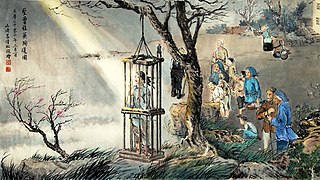
Agnes Tsao Kou Ying, or Cao Guiying, was a Qing dynasty Chinese layperson who was martyred for preaching the Gospel in Guangxi. She was canonized a martyr-saint by Pope John Paul II on 1 October 2000.

Augustine Zhao Rong was a Chinese Catholic priest who was martyred in 1815. He was canonized by Pope John Paul II on October 1, 2000, as one of the 120 Martyrs of China.
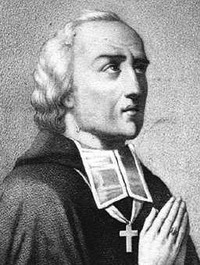
Louis Gabriel Taurin Dufresse, MEP was a French Catholic prelate who served as Vicar Apostolic of Se-Ciouen from 1801 to 1815. He was member of the Paris Foreign Missions Society.
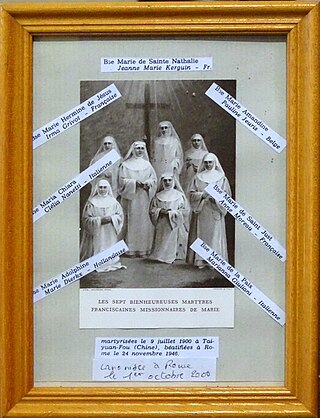
Marie of Saint Just, born Anne-Françoise Moreau was a French nun in the Franciscan Missionaries of Mary. She was one of the 120 Martyrs of China. She died in the province of Shanxi..
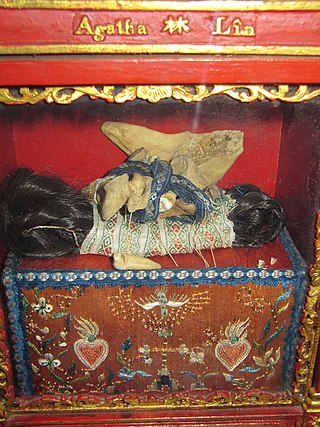
Agatha Lin, born in Qinglong in the Guizhou province of southwest China in 1817, was a Chinese saint and martyr. She was a headmistress and catechist, and one of the first to evangelize the Miao people. She was beheaded for her faith on January 28, 1858. Agatha was beatified by Pope Pius X on May 2, 1909, and canonized in 2000. Her feast day is February 18.

Saint Marie-Adolphine Dierkx was a Dutch nun who died for her faith in China during the Boxer Rebellion and was canonised in 2000. She is one of the group known as the Martyr Saints of China who were canonised by Pope John Paul II on 1 October 2000. Her birthplace has been converted into a chapel.

Saint Marie-Hermine of Jesus was a French nun and Mother Superior who died during the Boxer Rebellion in China and was canonised in 2000. She and six other nuns had gone to China to create a small hospital and to staff an orphanage, but were ultimately killed due to their association with foreign interference. She is one of the group known as the Martyr Saints of China who were canonised by Pope John Paul II 1 October 2000.
Saint Maria Chiara Nanetti or Mary Clare was an Italian religious sister who died for her faith in China during the Boxer Rebellion and was canonised in 2000. She is one of the group known as the Martyr Saints of China who were canonised by Pope John Paul II 1 October 2000.
Saint Marie de la Paix Giuliani was an Italian religious sister who died for her faith in China during the Boxer Rebellion and was canonised in 2000. She is one of the group known as the Martyr Saints of China who were canonised by Pope John Paul II 1 October 2000.
Paul Liu Hanzuo was a Sichuanese Catholic priest of the Paris Foreign Missions Society. He was martyred in 1818 by the Chinese government for being a Christian. He is a venerated as martyr and a saint in the Catholic Church.
Raimundus Li Quanzhen was layman and a devout Christian in the Apostolic Vicariate of Southeastern Zhili in Qing China, now the Roman Catholic Diocese of Xianxian. He was one of the first Christian martyrs during the Boxer Rebellion. He is one of the Martyr Saints of China.
Joseph Yuan was a Chinese priest and martyr of the 19th century.













